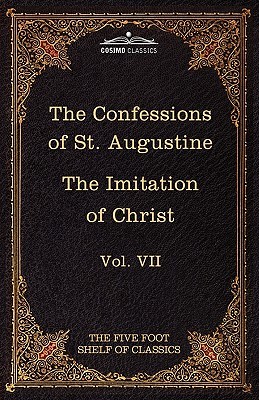
- We will send in 10–14 business days.
- Author: Thomas A Kempis
- Publisher: Cosimo Classics
- ISBN-10: 1616400641
- ISBN-13: 9781616400644
- Format: 14 x 21.6 x 2.5 cm, kieti viršeliai
- Language: English
- SAVE -10% with code: EXTRA
The Confessions of St. Augustine & the Imitation of Christ by Thomas Kempis (e-book) (used book) | bookbook.eu
Reviews
Description
Translator name not noted above: William Benham. Originally published between 1909 and 1917 under the name "Harvard Classics," this stupendous 51-volume set-a collection of the greatest writings from literature, philosophy, history, and mythology-was assembled by American academic CHARLES WILLIAM ELIOT (1834-1926), Harvard University's longest-serving president. Also known as "Dr. Eliot's Five Foot Shelf," it represented Eliot's belief that a basic liberal education could be gleaned by reading from an anthology of works that could fit on five feet of bookshelf. Volume VII features two of the most influential works of Christian spirituality and philosophy. The Confessions of Algerian bishop SAINT AUGUSTINE (354-430) is a foundational work of Western theology and one of the earliest autobiographies, offering keen insight into the workings of the medieval mind. The Imitation of Christ, by THOMAS Ã KEMPIS (1380-1471), is perhaps second only to the Bible in importance in Christian thought, offering the wisdom needed to find a direct path to a relationship with God.
EXTRA 10 % discount with code: EXTRA
The promotion ends in 23d.03:14:47
The discount code is valid when purchasing from 10 €. Discounts do not stack.
- Author: Thomas A Kempis
- Publisher: Cosimo Classics
- ISBN-10: 1616400641
- ISBN-13: 9781616400644
- Format: 14 x 21.6 x 2.5 cm, kieti viršeliai
- Language: English English
Translator name not noted above: William Benham. Originally published between 1909 and 1917 under the name "Harvard Classics," this stupendous 51-volume set-a collection of the greatest writings from literature, philosophy, history, and mythology-was assembled by American academic CHARLES WILLIAM ELIOT (1834-1926), Harvard University's longest-serving president. Also known as "Dr. Eliot's Five Foot Shelf," it represented Eliot's belief that a basic liberal education could be gleaned by reading from an anthology of works that could fit on five feet of bookshelf. Volume VII features two of the most influential works of Christian spirituality and philosophy. The Confessions of Algerian bishop SAINT AUGUSTINE (354-430) is a foundational work of Western theology and one of the earliest autobiographies, offering keen insight into the workings of the medieval mind. The Imitation of Christ, by THOMAS Ã KEMPIS (1380-1471), is perhaps second only to the Bible in importance in Christian thought, offering the wisdom needed to find a direct path to a relationship with God.


Reviews